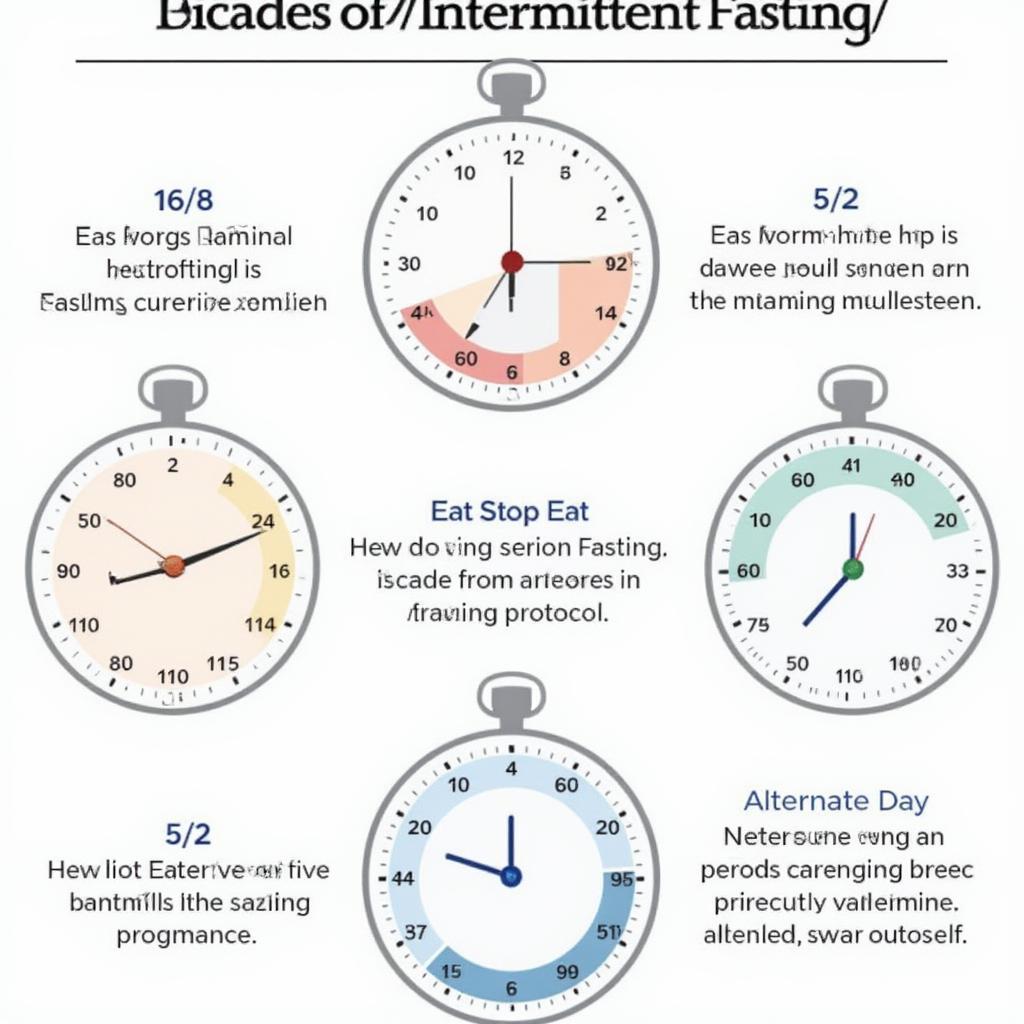Effective Intermittent Fasting for Weight Loss: A Comprehensive Guide

Intermittent fasting, or IF, has surged in popularity as a practical approach to weight management and overall health improvement. Unlike traditional diets that dictate what you should eat, IF focuses on when you should eat. This cyclical pattern of eating and fasting periods has shown promising results for many individuals looking to shed pounds effectively and sustainably.
Understanding Intermittent Fasting
Intermittent fasting isn’t a diet, but rather an eating pattern. It involves cycling between periods of eating and voluntary fasting on a regular basis. Different methods exist, but the fundamental principle remains the same: restricting your eating to specific time windows. This restriction, when done correctly, can lead to calorie reduction and, subsequently, weight loss. Many wonder how effective is intermittent fasting for weight loss, and the answer lies in understanding its mechanisms.
Common Intermittent Fasting Methods
Several variations of intermittent fasting exist, each with its own set of guidelines. Understanding these differences will help you choose the approach that best aligns with your lifestyle and preferences:
- 16/8 Method: Perhaps the most popular approach, this involves fasting for 16 hours each day and limiting your eating window to 8 hours. For example, you might eat between noon and 8 p.m. and fast the rest of the time.
- 5:2 Diet: This method involves eating normally for five days a week and restricting your calorie intake to 500-600 calories on two non-consecutive days.
- Eat Stop Eat: This involves a 24-hour fast once or twice per week. For example, you might fast from dinner one day to dinner the next day.
- Alternate-Day Fasting: As the name suggests, this method involves fasting every other day. On fasting days, you typically consume very few calories.

How Does Intermittent Fasting Promote Weight Loss?
The effectiveness of intermittent fasting for weight loss lies in several key mechanisms:
- Calorie Restriction: By limiting your eating window, you naturally tend to consume fewer calories throughout the day. This caloric deficit is the foundation for weight loss.
- Improved Insulin Sensitivity: Fasting can improve your body’s sensitivity to insulin, which helps regulate blood sugar levels and makes your body more efficient at using fat for fuel.
- Increased Fat Burning: During fasting periods, your body depletes its glycogen stores and starts burning fat for energy, a process known as ketosis.
- Hormonal Changes: Intermittent fasting can affect hormones associated with weight management, such as increasing the release of growth hormone, which aids fat loss and muscle preservation.
Dr. Emily Carter, a nutritionist specializing in weight management, states: “Intermittent fasting, when approached thoughtfully, can be a powerful tool for weight loss. However, it’s crucial to prioritize nutrient-rich foods during eating windows to maximize health benefits.”
Optimizing Intermittent Fasting for Weight Loss
While intermittent fasting can be effective on its own, several factors can optimize your success and make it a more sustainable practice.
Choosing the Right Method
The best method is the one you can consistently stick to. Experiment with different approaches and see which one fits best into your daily routine and preferences. Start slow and gradually increase the fasting window as you become more comfortable. For many, the 16/8 method provides a balanced starting point.
The Importance of Nutrient-Dense Foods
Intermittent fasting is not a free pass to eat whatever you want during your eating window. Focus on consuming whole, unprocessed foods that are rich in nutrients. This includes fruits, vegetables, lean proteins, and healthy fats. healthy weight loss diet for breastfeeding moms is an ideal starting point to understand the importance of proper nutrition. Avoid processed foods, sugary drinks, and excessive amounts of unhealthy fats.
Staying Hydrated
Drinking plenty of water is essential while practicing intermittent fasting. Dehydration can lead to increased hunger and fatigue. Other zero-calorie fluids, such as herbal teas and black coffee, are also permitted during fasting periods. However, be aware that some artificial sweeteners might trigger insulin response, which could be counterproductive.

Listening to Your Body
Pay close attention to your body’s signals. If you experience severe hunger pangs, extreme fatigue, or dizziness, you may need to adjust your fasting schedule or your overall diet. Intermittent fasting is not about deprivation; it’s about creating a sustainable eating pattern.
Combining with Exercise
Incorporating regular physical activity into your routine can amplify the weight loss benefits of intermittent fasting. Aim for a combination of cardiovascular exercise and strength training. This not only helps burn more calories but also builds lean muscle mass, which can improve your metabolism over time. Some people may even consider 1 meal a day for 7 days results but always approach any diet plan with caution.
Potential Challenges and How to Overcome Them
Like any diet or lifestyle change, intermittent fasting can come with its challenges. Being aware of these obstacles can prepare you to navigate them more effectively:
- Initial Hunger: It’s normal to feel hungry during the initial stages of intermittent fasting, as your body adapts to the new eating pattern. To manage this, focus on filling up on nutrient-dense foods during your eating window and drinking plenty of water.
- Fatigue and Low Energy: Some people may experience fatigue or low energy levels, especially during fasting periods. This often improves as your body becomes more accustomed to the pattern. Ensure you are getting enough sleep and consider adjusting your fasting schedule if necessary.
- Social Challenges: Intermittent fasting can pose social challenges, such as having to skip meals during gatherings or eating at unconventional times. Plan ahead and communicate your schedule with friends and family, and find ways to adapt to social situations without feeling overly restricted.
- Nutrient Deficiencies: It’s crucial to ensure that you consume a wide variety of nutrient-rich foods during your eating window. Consulting with a healthcare professional or registered dietitian can help you determine whether you need to take any supplements to avoid deficiencies.
- Individual Variation: The efficacy of intermittent fasting can vary significantly from person to person. It is important to consider individual circumstances, metabolic rate, activity levels, and health conditions, in order to achieve optimal results. If you are pregnant, you need to consult with your doctor first as there are nuances that need to be considered and you may need an alternative diet like that suggested in is it possible to lose weight while pregnant.
“It’s important not to view intermittent fasting as a one-size-fits-all approach. It works best when individualized and aligned with each person’s unique health profile”, says Dr. David Lee, a leading researcher in metabolic health.
Is Intermittent Fasting Right for You?
Intermittent fasting is generally safe for most healthy adults. However, certain individuals should consult with a healthcare professional before starting, including:
- Pregnant or breastfeeding women
- Individuals with a history of eating disorders
- Those with type 1 or type 2 diabetes
- People with a history of low blood sugar
- Individuals taking certain medications
If you are unsure about whether intermittent fasting is right for you, consult with your physician or a registered dietitian. They can provide personalized guidance based on your health status and goals. It’s not always about trying to find what is the best diet to lose weight quickly but instead opting for sustainable lifestyle changes.
A Sustainable Approach to Weight Loss
Intermittent fasting is not a magic bullet for weight loss. It’s a tool that, when combined with a healthy diet and lifestyle, can be a sustainable approach to weight management. It is important to listen to your body, make adjustments as needed, and prioritize long-term health over rapid results.
Conclusion
Effective Intermittent Fasting For Weight Loss involves more than just skipping meals. It’s about adopting a holistic approach that prioritizes healthy eating habits, adequate hydration, regular exercise, and listening to your body. By understanding the mechanisms behind intermittent fasting, choosing the right method for your lifestyle, and managing potential challenges, you can harness its power for sustainable weight loss and overall well-being. Remember, consistency and informed choices are key to achieving your goals with intermittent fasting.
Frequently Asked Questions
Q: Is intermittent fasting safe for everyone?
A: Intermittent fasting is generally safe for most healthy adults. However, those who are pregnant, breastfeeding, have diabetes, or have a history of eating disorders should consult with a healthcare professional before starting.
Q: Can I drink anything during my fasting period?
A: Yes, you can drink water, black coffee, and herbal teas during your fasting period. Avoid sugary drinks and those that might contain calories.
Q: How long does it take to see results with intermittent fasting?
A: The timeline for seeing results varies from person to person, but many individuals start noticing changes within a few weeks. Consistency is crucial for achieving sustainable results.
Q: What should I eat during my eating window?
A: Focus on consuming whole, unprocessed foods that are rich in nutrients. This includes fruits, vegetables, lean proteins, and healthy fats.
Q: Is it okay to exercise while intermittent fasting?
A: Yes, exercise can enhance the weight loss benefits of intermittent fasting. Consider timing your workouts within your eating window for optimal energy levels.
Q: Can intermittent fasting slow down my metabolism?
A: When done correctly, intermittent fasting doesn’t typically slow down metabolism; instead, it may improve metabolic health by enhancing insulin sensitivity and fat burning.
Q: How do I manage hunger pangs while fasting?
A: Drink plenty of water and focus on consuming nutrient-dense foods during your eating window. The initial hunger pangs will often subside as your body adapts.
Q: Can intermittent fasting help with long-term weight management?
A: Yes, intermittent fasting can be a sustainable approach to weight management when combined with a healthy lifestyle.
Q: What if intermittent fasting doesn’t work for me?
A: Everyone is different, so if intermittent fasting doesn’t work for you, consider exploring other healthy eating patterns and consulting a healthcare professional or dietitian for personalized guidance.




